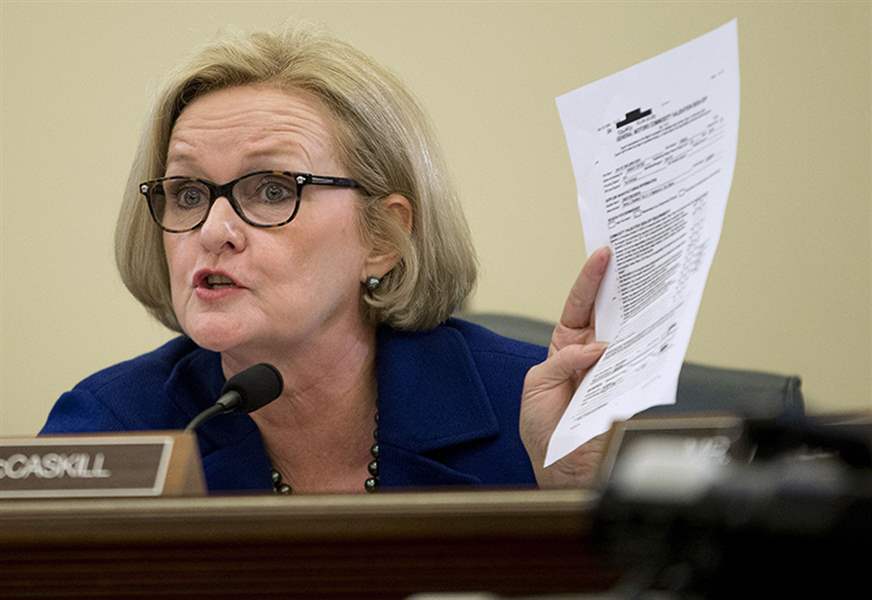
Senate panel attacks GM culture
CEO questioned over failure to fix switch that led to deaths
4/3/2014
Senate Consumer Protection subcommittee Chairman Sen. Claire McCaskill (D., Mo.), above, questions General Motors CEO Mary Barra on Capitol Hill during a hearing on GM’s faulty ignition switch.
ASSOCIATED PRESS

Senate Consumer Protection subcommittee Chairman Sen. Claire McCaskill (D., Mo.), above, questions General Motors CEO Mary Barra on Capitol Hill during a hearing on GM’s faulty ignition switch.
WASHINGTON — Soon after General Motors’ chief executive, Mary Barra, took her seat Wednesday before a Senate panel to answer questions about the company’s decade-long failure to fix a faulty switch linked to 13 deaths, she received a blunt message of what was to come.
The company, Sen. Claire McCaskill (D., Mo.) said, had a “culture of cover-up” that allowed an employee to lie under oath and discouraged quick action on fixing the defective switch that can accidentally cut off engine power and disable airbags.
There was little to back up Ms. Barra’s contention that GM had changed since emerging from bankruptcy in 2009, Ms. McCaskill said.
It took nine months, Ms. McCaskill said, before GM took any action once it was confronted in April, 2013, with evidence in a lawsuit that the switch had quietly been changed sometime in 2006.
And she was plain in characterizing the actions of a GM engineer, Ray DeGiorgio, who had testified in a court case that he knew nothing about the change in the switch.
On Tuesday, the House committee presented a document showing he had signed off on it.
“He lied,” said Ms. McCaskill, the panel’s chairman.
And she said the problem was with GM for “a culture that allowed an engineer at GM to lie under oath, repeatedly lie under oath.”
Wednesday’s hearing had many of the same trappings as Tuesday’s hearing before a House panel, with the families of victims filling the room to capacity, holding pictures of their lost children.

Barra
But the hearing had a much harsher tone as senators more aggressively questioned Ms. Barra’s contention that the cars are safe to drive and doubted her statement that the company had moved from a culture of cost-cutting to one of safety and a focus on the consumer.
“If this is the new GM leadership, it’s pretty lacking,” said Sen. Barbara Boxer (D., Calif.), later adding, “the culture that you are representing today is a culture of the status quo.”
Ms. Barra, seated at a green table, often sat and listened to the senators scold her and the company.
She was inundated with questions about the legality of GM’s behavior, particularly whether the company intentionally withheld documents from lawyers representing families suing the automaker.
Sen. Richard Blumenthal (D., Conn.) said he expected the company to come under intense scrutiny by investigators from the Justice Department.
“GM has a real exposure to criminal liability,” Mr. Blumenthal said. “I think it’s likely that GM will face prosecution.”
Ms. Barra frequently drew the ire of the senators when she repeatedly did not answer questions, saying either that she did not know or noting that an internal investigation was under way.
When Ms. McCaskill asked how many times GM had been sued over the switches and how many cases had been settled with secrecy provisions, Ms. Barra said she did not know.
“You haven’t had a briefing from your general counsel about how many cases have been filed? You have not had that briefing?” Ms. McCaskill asked.
“I’ve been focused on getting parts to customers,” Ms. Barra replied.
Ms. McCaskill asked again about the secret settlements.
“How much Whac-A-Mole has been going on?” she asked.
Ms. Barra’s prepared opening remarks were identical to those she gave Tuesday to a House subcommittee investigating the events leading up to GM’s recent recall of 2.6 million small cars, many of them Chevrolet Cobalts.
She said the company was still not sure why it took more than 10 years to recall cars equipped with a switch that can accidentally cut off engine power and disable airbags.
“When we have answers, we will be fully transparent with you, with our regulators, and with our customers,” Ms. Barra said.
The senators were easier on David J. Friedman, the acting administrator of the National Highway Traffic Safety Administration.
Mr. Friedman, who went to the agency from an environmental group where he specialized in fuel economy and alternative fuels, said that his agency was still struggling to understand the connection between bad ignition switches and the failure of the airbags to deploy.
“To be honest, it doesn’t make sense to me,” Mr. Friedman said.
One issue clearly within the purview of Congress is the government’s ability to see court documents that are sealed as a result of settlements between an automaker and the family of a person killed in a vehicle alleged to be defective.
As in the Ford-Firestone lawsuits in the 1990s, lawmakers fear that GM has settled suits secretly in Cobalt cases.
Ms. Barra declined to say.